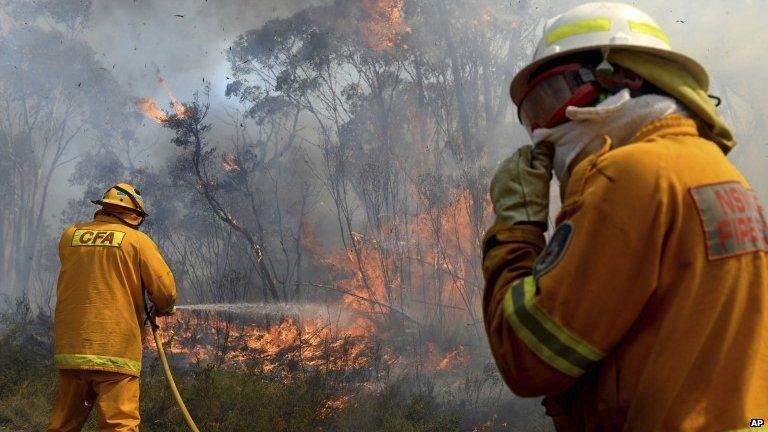Australia bush-dweller vows to fight fire
- Published
The BBC's Jon Donnison: "Wind has been the biggest problem for fire crews today"
On a normal spring day the tiny hamlet of Hartley Vale would be an idyllic spot, nestled in a lush valley in the heart of the Blue Mountains.
But on Wednesday, people living here had fire on their doorstep.
Thick white smoke billowed off the slopes of Mount York which backs on to a cluster of elegant wooden houses.
"You should have seen it last night," one local told me.
"It looked like a volcano."
Relays of helicopters whirred overhead through the smoky haze, dumping water onto the flames.
Strong swirling winds gusted up to 80km/h (50mph).
"We're hoping the wind is going to push it just to the side of us," Col McDonnell told me in front of his farmhouse.
"My plan is to stay and fight the fire. This property was built in 1823 and I don't intend to lose it."
Mr McDonnell is well prepared. He has a huge tank holding around 50,000 litres (13,000 gallons) of water and all the hoses and sprinklers needed to try and protect his home.
He hopes the open fields that separate his home from the bush will also provide some protection, acting as a firebreak.
One of the biggest dangers is an "ember storm" where strong winds blow hot ash and embers onto his house.
"We're trying to get as much water over the house as possible to stop any of those embers from flaring up."
But Mr McDonnell accepts the authorities may force him to go.
"If I was told to go then I guess I'd have to go, but I think I'm pretty right in terms of fire protection gear."
I ask him if he thinks climate change has anything to do with the severity of this year's fires, which follow what the Australian Bureau of Meteorology says was the hottest year on record.
"I don't think so," he says.
"I think its just part of the cycle. If you live in the bush you've just got to expect that."
He points out that people have been dealing with bushfires in Australia for hundreds of years.
We left Col McDonnell mid-afternoon as he fine-tuned the sprinklers around the house.
By nightfall as the winds began to drop it seemed firefighters had largely avoided the catastrophic day that they had feared.
There were no reports of any more houses being destroyed.
But it could take weeks - if not longer - to put these fires out.
Without a significant amount of rain they could continue to flare up at any time.
And of course it is not even summer here yet.
- Published23 October 2013
